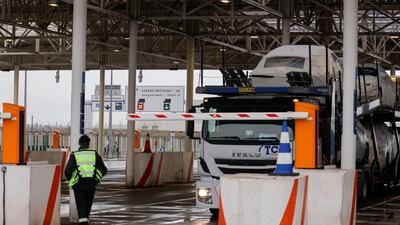Red tape, new “smart borders” that do not talk to each other and ill-prepared traders threaten border chaos, French hauliers said a day before the UK restores a hard frontier with continental Europe.
After clinching a narrow trade deal last week, Britain will complete its transition from the EU’s single market at 11pm local time on Thursday.
While the trade agreement maintains zero-tariff and zero-quota access between Britain and its biggest trading partner, there will be new formalities and paperwork.
Disruption is inevitable, said Sebastien Rivera, head of the National Federation of Road Hauliers in the northern Hauts-de-France region, which includes the port of Calais and Eurotunnel terminal through which millions of lorries pass every year.
"If you listen to the French and British authorities, the talk is of smart borders and full readiness, but that doesn't stop us having doubts," Mr Rivera told Reuters.
“It will be a real headache. Some companies will be ready, others won’t. It’s a major change of habits that lies ahead.”
He said not all businesses would have their paperwork, including Customs and safety declarations, ready and the IT systems necessary to trade between Britain and the EU from January 1.
Heavy stockpiling by UK companies as trade talks went down to the wire should mean freight volumes in January would be lower and allow for the new system to be established, Mr Rivera said.
“Our worry is what happens when we return to ‘normal business’ in mid-January,” he said.
The UK formally left the EU on January 31, 2020, 47 years after joining and three and a half years after its referendum on Brexit.
It entered a transition period in which rules on commerce and travel were frozen until the end of 2020.
While Britain will phase in full Customs formalities over the next six months, EU states are imposing them immediately.
French Customs employed another 700 agents nationwide to deal with the post-Brexit trade rules.
Almost half of them will be based at Calais port and the Eurotunnel terminal.
“We’re as ready as we can be. Are exporters ready?” regional Customs chief Gilbert Beltran said. “That’s where the unknown in this smart border lies.”
France and Britain’s new smart borders are not synchronised and Mr Beltran declined to predict when the systems might be connected.
Under the smart-border system, drivers going to France who have lodged export requests with the French authorities online will have a barcode scanned at the British port from which they depart.
Their number plates will be read automatically by cameras before a risk assessment is made while they cross the Channel.
During the journey, drivers will receive a message telling them whether they can drive freely through a “green lane” on arrival on French soil, or if they will be directed to an “orange lane” for more checks.
Haulage companies fear that if many lorries are not given the correct Customs documents by their clients, those requiring further checks will block the borders.
Calais port and the Eurotunnel terminal have enough parking space to allow checks to be halted for up to two hours without disrupting the flow of traffic, Mr Beltran said.
“Above two hours we will start having problems but that seems a very unlikely scenario,” he said.
For decades, the economic fortunes of Calais, from where England’s southern shore 34 kilometres away is clearly visible, have been intertwined with those of the UK.
The UK’s divorce with the EU was a sad moment, said Calais port chief Jean-Marc Puissesseau.
“Did Britain ever really integrate in Europe? I’m not sure,” Mr Puissesseau said.
“They always had one foot in and one foot out. We have Brexit and a deal. It could have been worse.”


